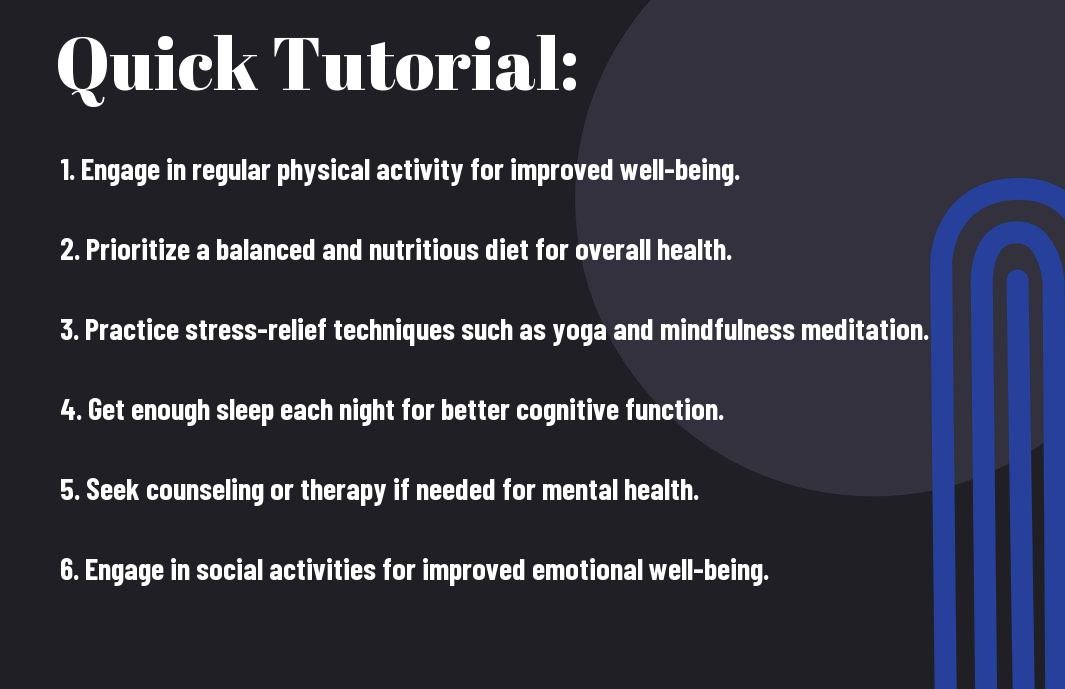Health and Wellness Activities for Students – Promoting Well-being in Academic Settings
- Home
- Health and Wellness Activities for Students – Promoting Well-being in Academic Settings

Health and Wellness Activities for Students – Promoting Well-being in Academic Settings
Indisputably, maintaining a healthy lifestyle is essential to thriving in a demanding academic environment. As a student, your overall well-being directly impacts your performance and success in school. In this tutorial, I will be sharing a range of health and wellness activities that are specifically tailored for students looking to enhance their physical, mental, and emotional well-being. From mindfulness exercises to tips for establishing a balanced study routine, I will provide practical strategies to help you prioritize your health while excelling in your studies. It’s time to take control of your well-being and thrive academically!
Key Takeaways:
- Physical activity is essential: Incorporating physical activities into academic settings is crucial for promoting well-being in students.
- Mental health support is necessary: Providing access to resources and support for mental health is important for student well-being.
- Creating a supportive environment: Academic settings should prioritize creating a supportive environment for students to thrive in both academically and personally.
- Healthy eating habits should be encouraged: Promoting healthy eating habits and providing nutritious food options in academic settings can positively impact student well-being.
- Stress management strategies are beneficial: Teaching students effective stress management techniques can help them navigate the challenges of academic life while maintaining their well-being.
Health and Wellness Activities for Students
Before diving into the academic responsibilities, it is crucial to prioritize your well-being. Engaging in health and wellness activities can significantly improve your physical and mental health, ultimately enhancing your academic performance. Here are some activities that can help promote overall well-being while studying.
Physical activities
Incorporating regular physical activities into your daily routine is essential for maintaining good health. Whether it’s a brisk walk, yoga, or a high-intensity workout, physical activities help improve blood circulation, release endorphins, and reduce stress. Not only does it enhance your physical fitness, but it also positively impacts your cognitive functions, enabling you to focus and concentrate better on your academic tasks.
Mindfulness and meditation practices
Practicing mindfulness and meditation can significantly reduce anxiety, improve concentration, and promote emotional well-being. Taking a few minutes each day to engage in mindful breathing or meditation exercises can help calm your mind and enhance your overall mental clarity. It is a valuable tool for managing academic stress and maintaining a balanced state of mind.
Healthy eating habits
Maintaining healthy eating habits is vital for fueling your body and mind. Consuming a well-balanced diet consisting of fruits, vegetables, lean proteins, and whole grains provides essential nutrients that support brain function and overall well-being. Avoiding excessive consumption of sugary, processed foods and staying hydrated can positively impact your energy levels and cognitive performance.
Stress management techniques
Implementing effective stress management techniques is crucial for maintaining a healthy balance in your academic life. Whether it’s deep breathing exercises, time management strategies, or seeking social support, finding healthy ways to cope with stress is essential. It can help prevent burnout, improve resilience, and enhance your overall well-being while pursuing your academic goals.
Creating a Supportive Environment
After recognizing the importance of a supportive environment in promoting students’ health and well-being, I have found that creating a sense of community and providing access to mental health resources are essential components in achieving this goal.
Building a sense of community
Creating a supportive environment for students involves building a sense of community within the academic setting. This can be achieved through organizing social events, group activities, and encouraging open communication among students. By fostering a supportive community, students can feel a sense of belonging and connection with their peers, which can contribute to their overall well-being.
Providing access to mental health resources
In addition to building a sense of community, it is crucial to provide access to mental health resources for students. This includes offering counseling services, organizing workshops on stress management, and promoting awareness of mental health issues. By providing access to these resources, students can feel supported and empowered to take care of their mental health, leading to a positive and healthy academic experience.
Integrating Health and Wellness into the Curriculum
Not only is it important for students to focus on their academic studies, but it is also crucial to prioritize their health and well-being. As an educator, I believe that integrating health and wellness into the curriculum can greatly benefit students in promoting a balanced and healthy lifestyle.
Incorporating well-being into lesson plans
When developing lesson plans, I make it a point to incorporate well-being activities into the curriculum. This may include short mindfulness exercises at the beginning of class, incorporating physical activity into the learning environment, or even utilizing resources that promote mental health awareness. By doing so, I ensure that students have the opportunity to focus on their well-being alongside their academic pursuits, ultimately creating a more positive and holistic learning environment.
Educating students about the importance of self-care
It’s important for students to understand the significance of self-care and how it plays a role in their overall well-being. I take the time to educate students about the importance of self-care practices, such as managing stress, getting enough sleep, eating well, and engaging in activities they enjoy. By doing so, I empower students to prioritize their mental and physical health, leading to improved academic performance and a greater sense of well-being.

Conclusion
Presently, promoting health and wellness activities in academic settings is vital for the well-being of students. By incorporating physical activity, mindfulness practices, and mental health support programs, we can create an environment that fosters positive well-being and academic success. It is my firm belief that prioritizing the health and wellness of students not only improves their overall quality of life but also enhances their ability to excel academically. I encourage you to take an active role in advocating for health and wellness activities in your school or academic institution to help create a supportive and nurturing environment for all students.
FAQ
Q: What are considered health and wellness activities for students?
A: Health and wellness activities for students include physical exercise, healthy eating habits, stress management techniques, mindfulness practices, and mental health support services.
Q: Why is promoting well-being important in academic settings?
A: Promoting well-being in academic settings is important because it directly impacts students’ ability to focus, learn, and succeed. It also contributes to creating a positive and supportive learning environment.
Q: How can physical exercise benefit students’ well-being?
A: Regular physical exercise can improve students’ physical health, reduce stress, boost mood, enhance cognitive function, and promote better sleep patterns.
Q: What are some effective stress management techniques for students?
A: Effective stress management techniques for students include deep breathing exercises, mindfulness meditation, time management skills, seeking social support, and engaging in hobbies or activities they enjoy.
Q: What resources are available for students to access mental health support services?
A: Students can access mental health support services through their school’s counseling center, therapy programs, support groups, hotlines, and online resources such as mental health apps and websites.
- Share
Mark Twain
Mark Twain stands at the helm of Create More Flow, infusing every sentence with the wisdom of his 15-year expeience through the seas of SEO and content creation. A former BBC Writer, Mark has a knack for weaving simplicity and clarity into a tapestry of engaging narratives. In the realm of content, he is both a guardian and a guide, helping words find their flow and stories find their homes in the hearts of readers. Mark's approach is grounded in the belief that the best content feels like a chat with an old friend: warm, inviting, and always memorable. Let Mark's expertise light up your website with content that's as friendly to Google as it is to your audience. Each word is chosen with care, each sentence crafted with skill - all to give your message the human touch that both readers and search engines love.
